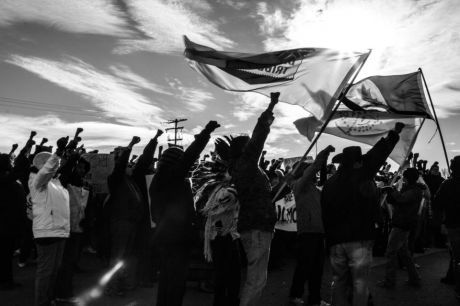News
You are here
Indigenous sovereignty and solidarity leads fight against Harper agenda

March 20, 2013
"Idle No More has sparked an awakening of Indigenous and non-Indigenous peoples internationally in support for democracy, human rights and environmental protections. In three short months, the movement has succeeded in raising global consciousness through education, cultural resurgence, and democratic political activism. We have shaken the foundations of inequality in Canada, and invited communities to join in a movement for social and environmental justice. We now need many more people to stand with us. The Harper government’s agenda is clear: to weaken all collective rights and environmental protections, in order to turn Canada into an extraction state that gives corporations unchecked power to destroy our communities and environment for profit. Harper is trying to extinguish Indigenous Peoples' Inherent, Aboriginal and Treaty rights to their territories, because these rights are the best and last protection for all Canadians...
We know it will take a lot more to defeat Harper and the corporate agenda. But against the power of their money and weapons, we have the power of our bodies and spirits. There is nothing that can match the power of peaceful, collective action in the defense of people and Mother Earth. Idle No More and Defenders of the Land, a network of Indigenous communities in land struggle, have joined together to issue this common call for escalating action...
We are calling on non-Indigenous people to join Indigenous communities in coordinated non-violent direct actions in the summer. Alternatives will only come to life if we escalate our actions, taking bold non-violent direct action that challenges the illegitimate power of corporations who dictate government policy."
We are looking at what will be a long, hot summer of indigenous-led actions opposing Stephen Harper’s Tories.The founders of Idle No More have formally allied with the Defenders of the Land, a pan-Canadian network of indigenous environmental activists. They have called for a "solidarity spring" and "sovereignty summer" of non-violent civil disobedience actions, such as road and rail blockades, to oppose Tory attacks on First Nations sovereignty and environmental protections. The demands of the joint call includes: repeal of Bill C-45, deepen democracy through consultation on legislation affecting collective righs and environmental protection, respect the right of indigenous people to say no to development on their territory, recognize and affirm Aboriginal Title and Rights, abandon seizure of Indigenous Nations lands and wealth, and actively resist violence against women and hold an indigenous women-led national inquiry into missing and murdered indigenous women and girls.
Just 24 hours later, chiefs and traditional leaders from 10 First Nations whose territories include the Tar Sands and the pipeline routes planned to carry Tar Sands synthetic crude gathered in Ottawa to sign a mutual support agreement. They declared that the pipelines will not pass through their lands. The escalation of Idle No More actions is in direct response to Tory attacks on First Nations sovereignty and environmental protections.
Resource extraction driven by extortion
This year the annual transfer payments from Ottawa to Canada’s First Nations contain a crucial provision: money will only be paid if First Nations agree to drop all opposition to the Tory omnibus legislation. This is pure extortion.
Nina Wilson, one of the four Saskatchewan women who launched Idle No More, reported that several First Nations receiving the coercive appendix along with their annual contribution agreements have refused to sign. Many more have signed, but stated that they did so under duress. Any First Nation that does not sign will run out of funds by mid-April.
The Tory omnibus bills contain direct attacks on environmental legislation and aboriginal sovereignty, two things that stand in the way of unfettered corporate access to northern resources. It was these attacks that spawned Idle No More. Now their extortion is a desperate bid to smash a growing movement.
That means we are headed for an unprecedented spring of confrontations between the Harper government, which thinks it can turn the clock back to the 1920s, and a resurgent movement for real First Nations self-determination.
Idle No More victory in Nova Scotia
Idle No More has won its most significant battle to date, but the national media has all but ignored the event. In Nova Scotia, Mi’kmaq activists Shelley Young (Eskasoni First Nation) and Jean Sock (Elsapogtog First Nation) started a hunger strike in opposition to a renegotiation of treaty rights known as the “Made In Nova Scotia” process. After 11 days on only water, they won.
The Kwilmu'kw Maw-klusuaqn Negotiation Office (KMKNO), which was negotiating with the province and the federal government, has withdrawn from the process, at least for now, because of growing pressure from the grass roots. There is nothing “Made in Nova Scotia” about it. Similar attempts to re-negotiate treaty rights are going on across the country. They offer lump sum cash payments in return for extinguishing land rights, and a watered down form of municipal “self-government” in place of the nation-to-nation relationship enshrined in historic treaties.
“We know our treaties have sustained our people for over 300 years and that they'll protect our people if we give them the power to,” Young told the Halifax Media Collective. “So we felt that if our treaties are compromised through these negotiations that there's no turning back. There's no turning back because these self-government agreements all across Canada have all failed.”
Government documents assessing this process make it plain that “the inherent right of self-government does not include a right of sovereignty in the international law sense, and will not result in sovereign independent Aboriginal nation states.”
Canada: international lawbreaker
Canada has ignored an official request for a visit from the United Nations special rapporteur on the Rights of Indigenous People, James Anaya. Anaya first contacted the Harper government in February of 2012, asking to visit to investigate the “human rights situation of Indigenous peoples.” He has followed up with two more requests. The Tories’ response has been utter silence. A UN rapporteur cannot make a formal visit without the acknowledgement of the government. “If I do not receive a positive response from the government in the coming months, I can explore ways of meeting with First Nations leaders from Canada outside the context of an official visit,” Anaya wrote in a recent letter to the Union of BC Indian Chiefs.
We don’t have to ask what Ottawa has to hide.
Harper’s record on dealing with the UN is wretched, especially concerning defence of rights of indigenous peoples. When the UN General Assembly first adopted the Declaration on the Rights of Indigenous Peoples in 2007, Canada was one of only four nations refusing to sign (along with fellow settler states Australia, New Zealand and the US). Along with enshrining the right of First Nations to maintain and strengthen their unique cultures, the Declaration “promotes their full and effective participation in all matters that concern them and their right to remain distinct and to pursue their own visions of economic and social development.” It insists that indigenous peoples must be fully and honestly informed about all the impacts of development in their territories and give their consent before development takes place.
Under domestic and international pressure, Harper’s government signed on to the Declaration in 2010. But in doing so, the Ministry of Aboriginal Affairs insisted it was only an “aspirational document”: “Although the Declaration is a non-legally binding document that does not reflect customary international law nor change Canadian laws, our endorsement gives us the opportunity to reiterate our commitment to continue working in partnership with Aboriginal peoples in creating a better Canada.”
Tory actions speak louder than their “aspirational” double talk. They are dedicated to clearing the way for full corporate exploitation of resources, and are not about to let First Nations get in their way.
Tory racism runs deep
From its Reform Party roots, Stephen Harper’s Tory government has embraced the goal of destroying Canada’s First Nations and assimilating aboriginal people into “mainstream” society. Of course that isn’t how they put it, at least in public. They call it “the establishment of a new relationship with aboriginal peoples…” When the Reform Party first hit the national stage back in 1995 its platform stated: “The Reform Party supports the federal government enabling aboriginal individuals, communities, and organizations to assume full responsibility for their well-being by involving them in the development, delivery, and assessment of government policies affecting them.
This would proceed with the goals of:
· Replacing the Department of Indian Affairs and Northern Development with accountable agencies run by and responsible to aboriginal peoples, and
· Improving the current economic state of aboriginal peoples by encouraging their full participation in Canada’s economic life and achievement of a state of self-reliance.”
It also supported “the principle that aboriginal individuals or groups are free to preserve their cultural heritage using their own resources.” (My emphasis). Cut through all the double talk, and the plan is: to finally destroy the collective identity and power of First Nations traditions; to replace national self-determination with feeble municipal “self-government”; and to impose individual ownership of private property in place of traditional relationships with the land.
When Reform morphed into today’s Conservative Party, and Harper was elected, they wasted no time acting on this agenda. Hearings were convened about introducing private property rights in First Nations, and promoting or imposing forms of self-government to replace traditional collective decision-making.
In 2010, the Assembly of First Nations almost unanimously voted to oppose the Tory plans. Still the Tories persisted in 2011 with their proposed First Nations Property Ownership Act, largely drafted by the now-disgraced Tom Flanagan. Though not yet law, the Act is still on the table.
This is the context in which the “Made in Nova Scotia” treaty re-negotiations, and similar processes are taking place. It underscores the enormity of the victory of Mi’kmaq activists who derailed the process. And it points to the desperation of the Tory threat to withhold funding from First Nations that oppose their legislation.
Small wonder that Idle No More has risen as the most potent and urgent opposition to the Tory agenda. We all need to show solidarity and support the sovereignty summer.
On Saturday March 23 there will be an all day conference "Nation to Nation Now: the conversations" at OISE, organized by Idle No More Toronto, the Indigenous Sovereignty and Solidarity Network, Muskrat Magazine, and the Justina M. Barnicke Gallery at Hart House. On Tuesday March 26 the International Socialists are hosting the public forum "Idle No More and the fight against the Harper agenda" (7pm at OISE, Toronto), featuring Idle No More activist Crystal Sinclair and International Socialist member Evan Johnston
Section:










